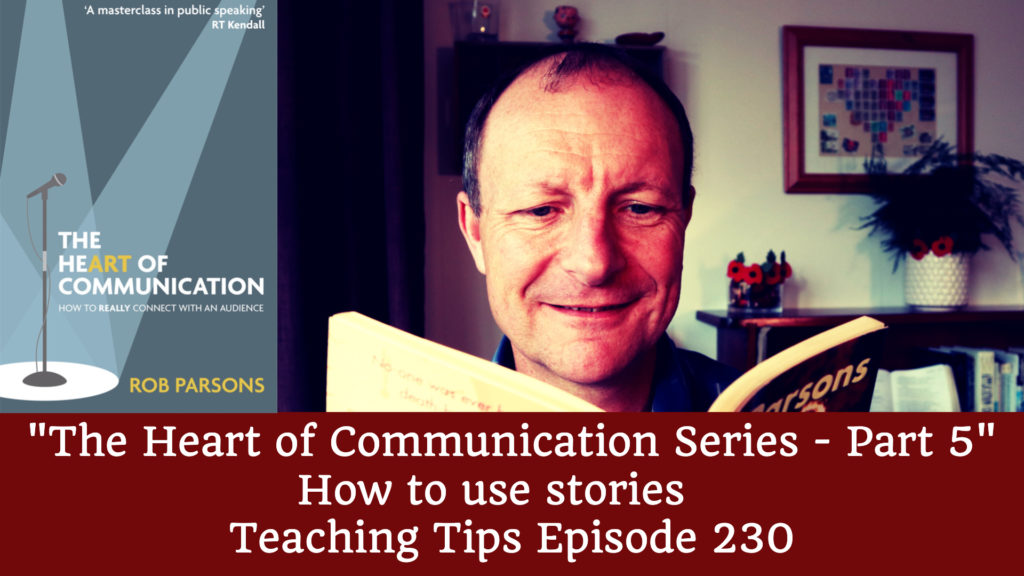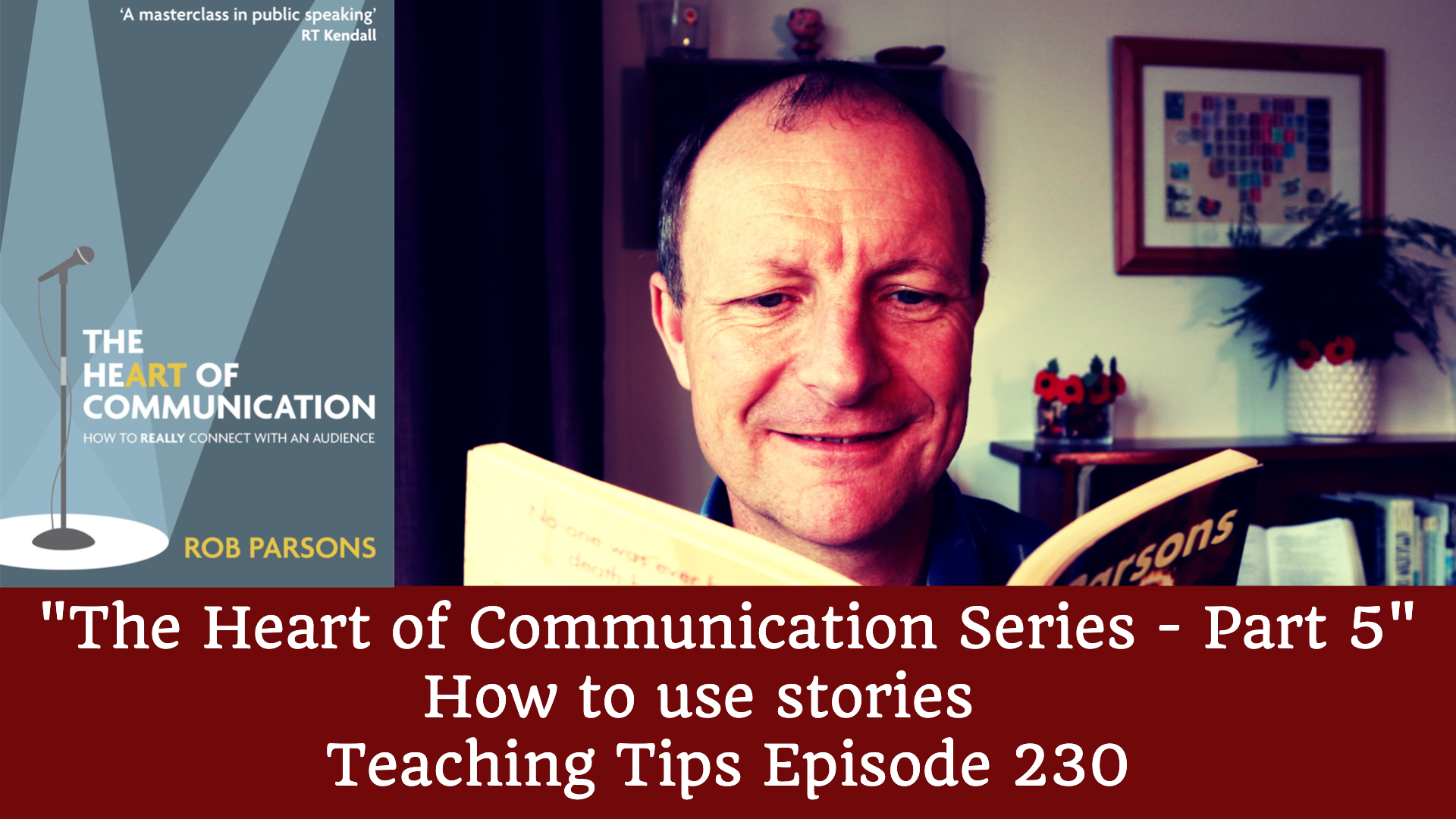Tuesday Teaching Tips Episode 230

Tuesday Teaching Tip 230
Introduction
“Reports convey information. Stories create experience. Reports transfer knowledge. Stories transport the reader, crossing boundaries of time, space, and imagination. The report points us there. The story puts us there.” Roy Peter Clark
Parsons, Rob. The Heart of Communication: How to really connect with an audience . John Murray Press. Kindle Edition.
After the New Year break we are returning to a series on this excellent book, “The heart of communication” by Rob Parsons. We’re in the fifth chapter in the book, and today we’re talking about stories.
You probably don’t need me or Rob Parsons to convince you of the effectiveness of stories. Why else would we read books, or watch films?
Stories are fundamental to the human condition. Muriel Rukeyser said, “The universe is made of stories, not atoms.”
In his book, “The storyteller’s secret”, Carmine Gallo said,
Show me an inspiring leader and I’ll show you a storyteller who influenced the way that leader sees the world. What does storytellers do? According to Walt Disney, they “Instil hope again, and again, and again.” Storytellers give us hope, and hope is a universal desire.”
Was Jesus a storyteller? Was he anything else?
“Jesus spoke all these things to the crowd in parables; he did not say anything to them without using a parable.” (Matthew 13:34 NIV11)
Rob gives us three brief tips for using stories affectively.
1. Detail
Relevant detail is the watchword here. Not detail for its own sake. But detail which helps us connect. When Jesus mentioned that the runaway son ate the food of the pigs, it would’ve resonated with his Jewish audience in a way that shocked them. That detail in the story was significant.
When including your stories, check to see that there is enough detail to make the story three-dimensional, but not so much that it catches up in the wind with all helpful information.
2. Empathy
When telling a story remember that its success largely depends upon creating empathy. The film critic, Roger Ebert said,
Movies are the most powerful empathy machine in all the arts.
We have all watched films which had decent acting, a reasonable script, and competent photography and yet, found them boring. Films in which we fail to feel any connection with the actors are seldom successful.
I challenge you to read the story of Lazarus in Luke 16 and not feel empathy. Perhaps you will struggle to do so now because you’ve read it many times. But if you were to hear it afresh, I suggest you would empathise with Lazarus.
When preparing your stories, ask yourself whether any of the characters are empathetic?
3. Application
Some stories need an application. Others are so powerful that you can leave the Holy Spirit to have his affect on the hearts of those present.
When considering the stories to add to your presentation, ask yourself whether that particular story needs applying to your audience.
Jesus varied his approach. He did not immediately apply the parable of the weeds in Matthew 13. His disciples had to ask him later to explain it.
“His disciples came to him and said, “Explain to us the parable of the weeds in the field.”” (Matthew 13:36 NIV11)
On the other hand, after the parable of the merciful servant in Matthew 18 he said this,
““This is how my heavenly Father will treat each of you unless you forgive your brother or sister from your heart.”” (Matthew 18:35 NIV11)
Conclusion
How do you feel about using stories? Are you comfortable or confused? In your next lessonWhy not include at least one story and put it through the filters of the three practical is above: Detail, empathy, application.
Questions: Do you have a method for storing your stories? You never know when you might need them next.
I have recorded previously on stories. Here are some links:
Tuesday Teaching Tips, Episode 96: “How to re-enact a story”
Tuesday Teaching Tips, Episode 96: “How to re-enact a story”
Tuesday Teaching Tips, Episode 90: “What is the difference between an anecdote and a story?”
Tuesday Teaching Tips, Episode 90: “What is the difference between an anecdote and a story?”
Tuesday Teaching Tips, Episode 165: “Why You Need Keynote Stories”, Malcolm Cox
Tuesday Teaching Tips, Episode 165: “Why You Need Keynote Stories”, Malcolm Cox
Please add your comments on this week’s topic. We learn best when we learn in community.
Do you have a question about teaching the Bible? Is it theological, technical, practical? Send me your questions or suggestions. Here’s the email: malcolm@malcolmcox.org.
If you’d like a copy of my free eBook on spiritual disciplines, “How God grows His people”, sign up at my website: http://www.malcolmcox.org.
Please pass the link on, subscribe, leave a review.
“Worship the LORD with gladness; come before him with joyful songs.” (Psalms 100:2 NIV11)
God bless, Malcolm
PS: You might also be interested in my book: “An elephant’s swimming pool”, a devotional look at the Gospel of John



